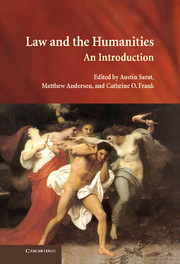Book contents
- Frontmatter
- Contents
- Contributors
- Acknowledgments
- Introduction: On the Origins and Prospects of the Humanistic Study of Law
- I PERSPECTIVES ON THE HISTORY AND SIGNIFICANCE OF SCHOLARSHIP IN LAW AND THE HUMANITIES: THREE VIEWS
- II IDEAS OF JUSTICE
- 4 Biblical Justice: The Passion of the God of Justice
- 5 Ideas of Justice: Natural and Human
- 6 Ideas of Justice: Positive
- 7 Postmodern Justice
- III IMAGINING THE LAW
- IV LINGUISTIC, LITERARY, AND CULTURAL PROCESSES IN LAW
- V INSTITUTIONAL PROCESSES
- Index
- References
7 - Postmodern Justice
Published online by Cambridge University Press: 20 January 2010
- Frontmatter
- Contents
- Contributors
- Acknowledgments
- Introduction: On the Origins and Prospects of the Humanistic Study of Law
- I PERSPECTIVES ON THE HISTORY AND SIGNIFICANCE OF SCHOLARSHIP IN LAW AND THE HUMANITIES: THREE VIEWS
- II IDEAS OF JUSTICE
- 4 Biblical Justice: The Passion of the God of Justice
- 5 Ideas of Justice: Natural and Human
- 6 Ideas of Justice: Positive
- 7 Postmodern Justice
- III IMAGINING THE LAW
- IV LINGUISTIC, LITERARY, AND CULTURAL PROCESSES IN LAW
- V INSTITUTIONAL PROCESSES
- Index
- References
Summary
Justice and the postmodern share the paradoxical quality of being unsusceptible to easy definition. Justice has the edge in terms of length of history and diffusion of uses and is second only to time as an intractably venerable object of conceptual elaboration. It is indeed often defined by reference to what it is not, its lack, the instance of injustice but then an ambiguous prefix has already complicated the plurality of definitions beyond any easy etymological or legislative redemption. The postmodern shares the problem of the prefix if not that of the stature and duration of the aporia of meaning.
The postmodern bears an amusingly ludic if not virtually unintelligible prefix. That is to say, on the one hand, that the prefix is post, the before is after, and on the other hand, and with equal obscurity the post here precedes the modern. As the modern is by most definitions that which is contemporary, here, now, and new, it is hard to make sense of a prefix that suggests a novelty that exceeds the modern. The quarrel between the ancients and the moderns, between the pre and the post, is thus here complicated not only through the contemporary context of culture wars but also by dint of the notion of an antiquity that comes after the modern. To this it has to be added that the postmodern is used to qualify an already chimerical justice.
- Type
- Chapter
- Information
- Law and the HumanitiesAn Introduction, pp. 188 - 210Publisher: Cambridge University PressPrint publication year: 2009



